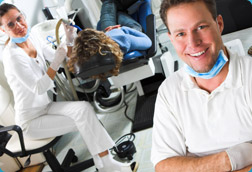Orthodontics / Orthodontic Specialist
Orthodontics is the use of appliances such as braces to help adjust crooked teeth or realign teeth with an overbite or underbite. It is an area of dentistry which is becoming more and more popular. The reason for this popularity is because old-fashioned ‘train track’ braces are becoming a thing of the past. There are now new products on the market that move teeth faster, are more comfortable to wear and are virtually invisible when you talk or smile. So they are much more discrete to wear and make it much easier to get the results you want.
In the past, it was mainly children and teenagers who would wear braces to encourage their teeth to grow in the right way. Now, far more adults are seeking orthodontic treatment to improve their smile, which has caused the industry to expand rapidly.
What does the job involve?
As an orthodontic specialist, you will treat patients who want to move crooked teeth for aesthetic reasons or who need to realign their bite to avoid putting stress and strain on their teeth and jaw joints in the future. Some patients who only need their teeth moved slightly can a see a difference in six months. Others, with a severe over or underbite, may need to visit an orthodontist regularly for up to three years.
In this time, the orthodontist will identify the type of product that suits a particular patient. Then, by regularly adjusting the brackets and elastics that make braces work, the orthodontist can exert the right amount of pressure on teeth to ensure that they are gradually moved into their optimum position.
What qualifications do you need?
First and foremost, you need to gain the required A-Levels to study Dentistry. A degree in Dentistry will take five years to complete. To become a specialist Orthodontist, you will then also need to study for at least a further three years on an orthodontic training programme.
In reality, it often takes much longer to become a specialist Orthodontist, as many people usually practice as a family dentist for a number of years to build their patient skills, experience and expertise. It is rare for an individual to choose to specialise immediately upon entering the profession.
What are the career prospects?
A career as an orthodontist can be very rewarding. You can work in a specialist private practice or in a hospital. Other specialist orthodontists develop their careers in academia.
You can also continue to study and gain a further qualification called a Fellowship of Dental Surgery, which enables you to become a hospital Consultant.
Featured Jobs
-
Example Job
- Salary:
- £24,000
- Location:
- Preston, Lancashire
Lorem ipsum dolor sit amet, consectetuer adipiscing elit. Nam nisl ipsum, interdum id, fermentum ut, convallis sed, tellus.
More Info -
Example Job
- Salary:
- £24,000
- Location:
- Preston, Lancashire
Lorem ipsum dolor sit amet, consectetuer adipiscing elit. Nam nisl ipsum, interdum id, fermentum ut, convallis sed, tellus.
More Info -
Example Job
- Salary:
- £24,000
- Location:
- Preston, Lancashire
Lorem ipsum dolor sit amet, consectetuer adipiscing elit. Nam nisl ipsum, interdum id, fermentum ut, convallis sed, tellus.
More Info
